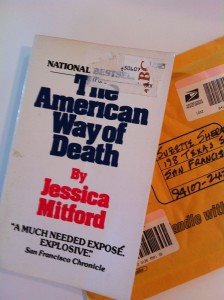As SevenPonds grows, I continue to be deeply touched by fans who reach out to me in a multitude of ways. I receive emails, calls, letters and some even approach me at conferences and events. I cannot begin to tell you how amazing it feels each time I realize we have touched someone in such a way that they take the time to contact us. It’s the octane that fuels me to move forward and not give up on the relentless hard work of building SevenPonds.
Last week in the mail arrived the most unusual fan gift yet, a padded envelope with a softcover version of Jessica Mitford’s classic book, “The America Way of Death.” There was no note and no real need for one since the book itself said it all, like a giant hand reaching out and nudging me, “read this!”
If you’re unfamiliar with this particular Mitford’s book, it’s a complete exposé of the high-pressure tactics of the funeral business, written back in 1963. The book led the Federal Trade Commission to create the “Funeral Rule” law to protect consumers shopping for funeral services. Let’s just say for those who have not read it, it’s a historical must.
The book landed on my desk just as I returned from the Association of Death Education and Counseling (or ADEC) annual conference in Hollywood. I spent 3 days attending lectures on the most innovative approaches and changes taking place within end-of-life care. I was surrounded by the most amazing experts, in fact, I had tears rolling down my cheeks in more than a few sessions. Talk about the new American way of death! Every ADEC-er is on their own mission to make the end-of-life process the best experience possible. While much of the funeral business hangs on to its current state of affairs, the end-of-life experts who help us through the process before and after disposition are blazing new trails. They are shaking the dust off death, taking it out of the unspoken macabre shadows and into the beauty of the natural light of the cycle of life.
But back to Mitford’s book. Yes, I have read it. It was the very first book that I read over twenty three years ago, when I first started researching the topic of death and dying. And yes, I’ve been at this for a long time and have more understanding of the industry than the casual reader would realize. I would have to agree with Mitford; change is much needed.
Thankfully, there was a name and return address on the envelope. Thank you, Robert M. Rayme of Maryland, for your unique message. I’d also offer a big hug, too. Yup, I get it, rest assured. In fact, it was my own gut about how unnatural the practice of funerals felt that had me started on my journey to build SevenPonds. As you can tell from recent news in our blog, big changes with respect to death and dying are quickly happening, while the funeral industry remains relatively stagnant. As a funeral director once pointed out to me, regardless of your cultural, economic or educational background, all funerals in the U.S. are the same.
Times are changing, with home funerals and Taharah reemerging as examples of how we are returning to the practices of the past and taking control of how we want our end-of-life experience to be. And Robert — yes, I owe our readers more coverage on the death industry — be it good or bad.
My apologies to all who have reached out to me in the past to whom I have not had the time to answer — especially in an entire post like this.
For other very interesting posts on the funeral industry:
* One of my most-read posts journaling my shocking visit to Aurora Casket Company — a definite crowd pleaser.
* Our section on the Funeral Rule that protects consumers when shopping for funeral services. Do you know your rights?
* My post on how to shop for funeral services since the industry has a lot more going on than meets the eye.
* Thomas Lynch who, like me, also hails from the Detroit area (not far from the real Seven Ponds lakes) and is quintessential old-school. He writes beautiful poetry, and his book, “The Undertaking: Life Studies from the Dismal Trade” , is the most delightful read that offers an insider’s view of the industry and explains how a typical funeral director thinks.

 From The Old American Way of Death to the New American Way
From The Old American Way of Death to the New American Way




 “Help Me, Helen”
“Help Me, Helen”
 Recovering Cremation Remains After the Los Angeles Fires
Recovering Cremation Remains After the Los Angeles Fires
 “As Tears Go By” by Marianne Faithfull
“As Tears Go By” by Marianne Faithfull














